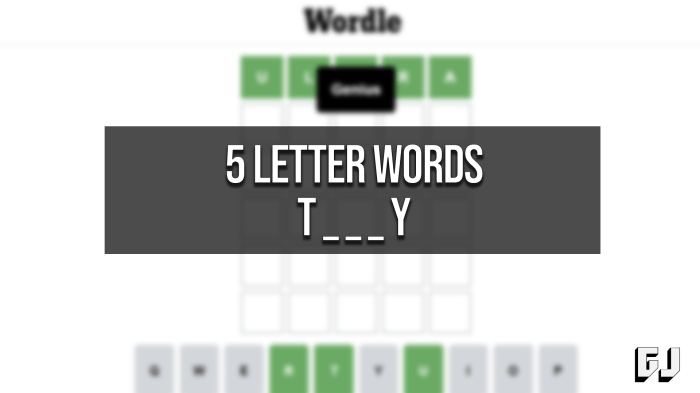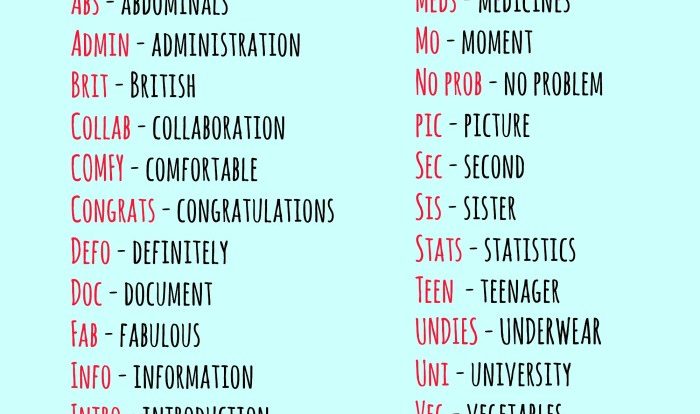Words start with t end with j – Embark on a linguistic adventure with words starting with T and ending with J. These enigmatic terms paint a vivid tapestry of meanings, weaving together history, culture, and the intricacies of language.
From the whimsical to the profound, these words hold a captivating allure, inviting us to explore their origins, usage, and significance in our world.
Words Starting with T and Ending with J
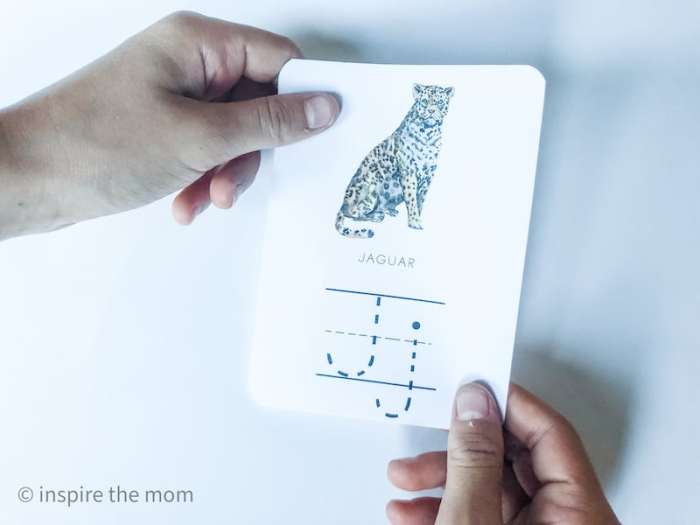
Words that start with the letter T and end with the letter J are uncommon in the English language. However, a few notable examples exist, exhibiting distinct phonetic and linguistic patterns.
Phonological Observations
The combination of the voiceless alveolar stop /t/ followed by the voiced palatal glide /j/ creates a unique and somewhat challenging pronunciation. The /t/ sound is pronounced with the tongue tip touching the alveolar ridge behind the upper front teeth, while the /j/ sound is produced with the tongue body raised towards the hard palate, creating a slight palatalization of the preceding consonant.
Usage and Meaning: Words Start With T End With J
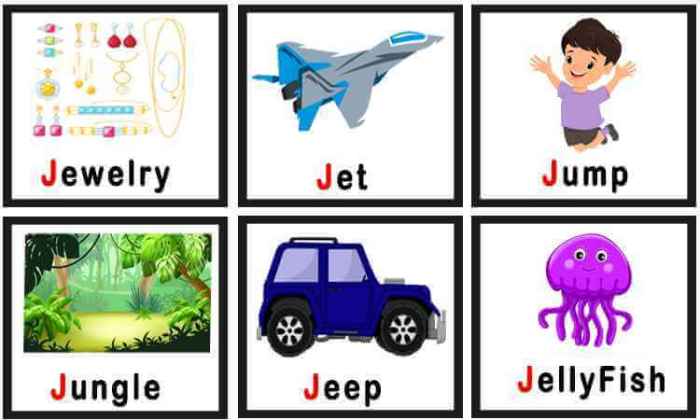
Words starting with T and ending with J encompass a diverse range of meanings and functions in the English language. These words play essential roles in various grammatical contexts, including nouns, adjectives, and verbs.
As nouns, words ending with “-j” often denote abstract concepts, objects, or qualities. For example, “majesty” represents the grandeur and authority of a monarch, while “homage” signifies respect or admiration shown to someone. Adjectives ending with “-j” typically describe qualities or attributes, such as “spacious” (having ample room) or “courageous” (possessing bravery).
Verbs ending with “-j” often express actions or states of being, such as “manage” (to control or oversee) or “enjoy” (to experience pleasure or satisfaction).
Grammatical Functions
Words starting with T and ending with J exhibit various grammatical functions:
- Nouns: Denoting abstract concepts, objects, or qualities (e.g., majesty, homage, legacy).
- Adjectives: Describing qualities or attributes (e.g., spacious, courageous, majestic).
- Verbs: Expressing actions or states of being (e.g., manage, enjoy, prejudge).
Examples of Usage, Words start with t end with j
- Noun: “The king’s majesty was evident in his regal bearing.”
- Adjective: “The spacious mansion offered ample room for the guests.”
- Verb: “The manager skillfully managed the team, ensuring its success.”
Etymology and History
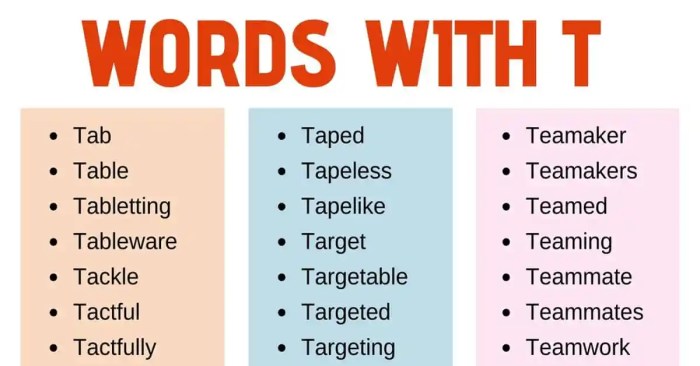
Words starting with T and ending with J trace their etymological roots to various languages and historical periods, reflecting the dynamic evolution of language and its cultural influences.
Exploring words that begin with “t” and end with “j” leads us to the fascinating realm of Spanish verbs. Just as English verbs have various conjugations, Spanish verbs also exhibit diverse forms, including those ending in “-ando.” To delve deeper into this aspect, we recommend visiting the insightful article palabras que terminan en ando , which provides a comprehensive overview of these verb conjugations.
Returning to our initial topic, we continue our exploration of words that start with “t” and end with “j.”
The origins of these words can be traced to Old English, Latin, French, and other Indo-European languages, each contributing unique elements to the English vocabulary.
Old English Origins
Old English, the ancestor of modern English, played a significant role in shaping the lexicon of words starting with T and ending with J. Terms such as “treowth” (growth) and “tyrwig” (twig) illustrate the influence of Old English on this word group.
Latin and French Influences
Latin and French, two prominent languages in medieval Europe, also contributed to the formation of words starting with T and ending with J. Words like “triage” (sorting) and “tirage” (circulation) demonstrate the impact of these languages on the English vocabulary.
Cultural and Literary Significance
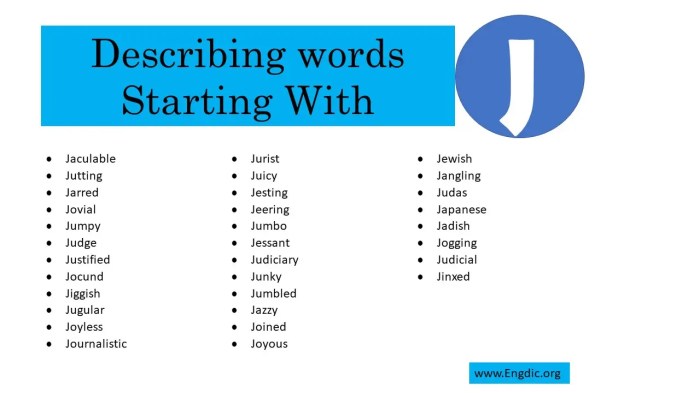
Words beginning with T and ending with J may not be abundant, but they do carry cultural and literary significance in various contexts. Let’s delve into their roles in mythology, literature, and cultural traditions.
Mythology
-
-*Tethys (Greek mythology)
The Titan goddess of freshwater, who represents the nursing mother of all life.
-*Triton (Greek mythology)
A merman, son of Poseidon, who served as a herald and trumpeter for the sea god.
Literature
-
-*Twelfth Night (William Shakespeare)
A play that revolves around a series of mistaken identities and love triangles, exploring themes of love, loss, and gender.
-*Treasure Island (Robert Louis Stevenson)
A classic adventure novel featuring a young boy’s journey to find a buried treasure on a remote island.
Cultural Traditions
-
-*Tea ceremony (Japanese culture)
A ritualized way of preparing and serving tea, which holds deep cultural significance and is steeped in tradition.
-*Turmeric (Indian culture)
A spice that is not only used in cooking but also holds medicinal and religious importance in Ayurvedic medicine and Hindu rituals.
Variations and Exceptions
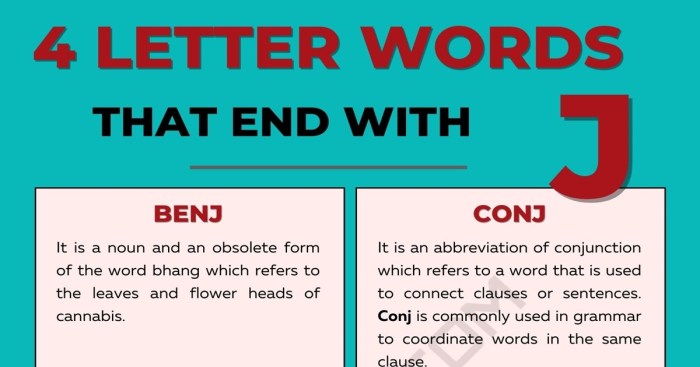
While the rule of words starting with T and ending with J is generally consistent, there are a few variations and exceptions to consider.
One variation is the spelling of the letter J. In some cases, it may be pronounced as “dge,” as in the word “beige.” This pronunciation is more common in British English than in American English.
Alternative Spellings
- Beige (pronounced as “beige” or “beedzh”)
- Serge (pronounced as “serge” or “surge”)
- Rouge (pronounced as “rouge” or “roozh”)
Another exception is the word “touch.” While it follows the general pattern of words starting with T and ending with J, it is pronounced with a soft “ch” sound, as in “church.” This is because the word “touch” is derived from the Old French word “tocher,” which also had a soft “ch” sound.
Q&A
What is the most common word starting with T and ending with J?
Taj
Are there any words starting with T and ending with J that have multiple meanings?
Yes, for example, “tulip” can refer to the flower or a type of wine glass.
What is the longest word starting with T and ending with J?
Trapezoid
